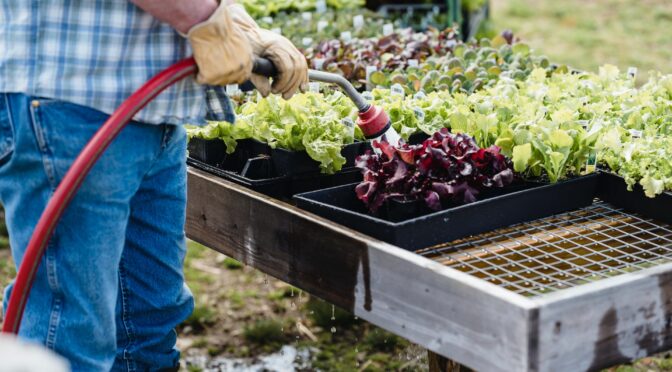There’s a lot of vocabulary in the gardening world these days! As you dive into gardening, you’ll hear folks talking about regenerative agriculture, biological farming, heirlooms, open-pollinated crops, permaculture, and more. Especially if you’re new to gardening, all this jargon can get a bit confusing, so today, I thought we’d cover one of the big ones: “organic.” You’ve probably seen this word in various contexts, from food and seeds to methods or maybe even your chemistry class. So what does organic mean?
For our purposes, we’ll be focusing on the agricultural use of the word organic.
Certified Organic
When we’re talking about gardening, whether it’s seeds, plants, vegetables, herbs, or livestock, you’ll want to focus on USDA-certified organic.
According to the United States Department of Agriculture (USDA): “Organic meat, poultry, eggs, and dairy products come from animals that are given no antibiotics or growth hormones. Organic food is produced without using most conventional pesticides; fertilizers made with synthetic ingredients or sewage sludge; bioengineering; or ionizing radiation.”
Farms that aren’t organic are generally referred to as conventional. If a conventional farm wanted to become certified organic, its fields would need to be free of non-organic products like fertilizer for three years before getting their certification.
The Organic Materials Review Institute
Does that mean organic farmers don’t use fertilizers or pesticides? No, they may still use products that have been certified by the Organic Materials Review Institute. You may see the OMRI label on seed starting mixes, fertilizers, and even certain organic pesticides like neem oil.
As we’ve discussed in previous posts, it’s important to remember that when using these products, organic doesn’t necessarily mean harmless or safe. While generally less harmful than chemical pesticides, organic pesticides may still affect beneficial insects as well as pests. Organic fertilizers can still cause dangerous algae looms if allowed to run off into waterways. They can still cause adverse effects in humans too. Use caution when applying them to avoid breathing them in or getting them on your skin or eyes.
We recommend using these products sparingly and instead turning to other practices like crop rotation, cover cropping, and attracting beneficial insects whenever possible.
Are Conventional Farms Bad?
The short answer is no; it depends on the farm. Buying local food and getting to know your farmers is an excellent way to ensure their practices align with your beliefs.
Not all farms opt to receive an organic certification, which can be a significant expense for small operations. Even those farms which don’t have an organic certification may still practice sustainable agriculture and may even largely or entirely follow organic practices.
Unfortunately, the opposite is also true. Some farms, particularly large-scale industrial farms, may have practices that follow organic regulations but don’t necessarily align with your values. Sadly, an organic certification does not necessarily guarantee food that is good for you or good for the planet.
SESE Organic Seeds
Many of our customers are interested in organic seeds, and we offer them whenever possible. Look for the “OG” symbol next to a variety’s name.
There’s a lot to learn about agricultural practices and terminology. Understanding what organic means can help you make appropriate choices for your garden and table.

